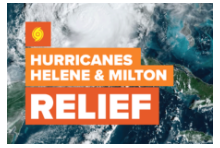In September 2024, back-to-back major Hurricanes Helene and Milton made landfall in Florida, leaving at least 255 dead and causing lasting devastation in communities across Florida, Georgia, the Carolinas and Tennessee. The Category 4 and Category 3 hurricanes destroyed critical infrastructure including major roads, homes and buildings, and severely incapacitated the power grid and water and sewage systems.
To date, Hurricane Helene has broken records of rainfall, flooding, location and storm strength and size across the affected states. The storm is the third major hurricane to hit Florida’s Big Bend region in the past 13 months and the fourth hurricane to hit the Gulf Coast this year. Helene is the strongest storm in recorded history to make landfall at the Big Bend and early assessments report that the damage caused in Florida by Helene is more than 2024’s Hurricane Debby and 2023’s Hurricane Idalia combined. Less than two weeks later, Hurricane Milton followed Helene's path toward Florida. Milton made landfall on Wednesday, October 9th, as a Category 3 hurricane hundreds of miles wide, affecting many of the same communities hit by Hurricane Helene.
International Medical Corps has implemented a multi-state response to
both Hurricanes Helene and Milton across four affected states—Florida,
Georgia, North Carolina and Tennessee—since September 26. We
have partnered with state and local governments, health center organizations and networks, and other local actors to provide direct health services, water and sanitation supplies, and medical and non-medical equipment to affected communities.
In response to Hurricane Milton, International Medical Corps is coordinating closely with the Florida Association of Community Health Centers (FACHC), existing health facility partners, and county- and state-run distribution centers to identify and disseminate urgently needed emergency supplies, equipment and other items. For example, one large federally qualified health center (FQHC) network south of Tampa was heavily impacted by Hurricane Milton, with four health centers—including a specialized care clinic for individuals with chronic illnesses—taken offline due to severe damages.
In response to Hurricane Helene across Florida, Georgia, North Carolina and Tennessee, International Medical Corps has responded by distributing urgent medical and non-medical items and by providing direct medical services. Over the course of the response, we have facilitated the shipment and distribution of 10,144 hygiene kits, 1,512 wound-care kits, and 20,441 hygiene and emergency items to 82 sites—including health facilities, community centers and recovery centers—across the region. International Medical Corps has also delivered 14 1,000-gallon water tanks, 6,000 gallons of potable water to various health facilities, to ensure the restoration and continuation of operations and services.
Since 2005, International Medical Corps has responded to US and Caribbean emergencies, starting with Hurricane Katrina. We partner with national, state, and local healthcare systems to address challenges and deploy emergency teams in disasters. Our response efforts include the 2010 Haiti earthquake, 2012's Superstorm Sandy, 2017's Hurricane Maria, 2018's Hurricane Michael and more. In the past seven years, we've supported over 6 million patients across 18 states and territories through partnerships with more than 275 hospitals, clinics, and health facilities.
Help respond to Hurricane Helene and Milton's devastation. By supporting this project or creating a giving opportunity of your own, you can make a lifesaving difference by helping provide medical care, supplies, and relief to affected communities in the US.
*Please Note for recurring donations: Once we have determined that the community can continue to respond to the after-effects of this emergency without us, we will scale back our response efforts. At that time, we will redirect your future donations where they are needed most to help us respond to future outbreaks of conflict, disease or disaster.
